Tocqueville asked me yesterday about fuel dumping award tickets and I thought it only fair to share my answer with y’all.
Airlines that add fuel surcharges onto award tickets generally will charge the same amount that would apply on an identical paid reservation.
He was specifically asking about reducing fuel surcharges using points with Air Canada’s Aeroplan. Now, here’s how to avoid fuel surcharges entirely when booking with Aeroplan.
But if you must use one of their partner airlines where fuel surcharges apply, there are times where you can make the fuel surcharge less expensive. Much less expensive.
He wanted to book those rare first class awards showing as available in advance on Lufthansa. That means fuel surcharges when using Aeroplan, or most Star Alliance frequent flyer programs.
The key thing to know is that fuel surcharges vary by market. In general, for instance, fuel surcharges between the US and Europe are lower than between Canada and Europe. So if a Canadian were to fly Canada – Europe, and then Europe – Canada – US, they can save some money on fuel surcharges (and just not take the flight between Canada and the US).
Let’s take an itinerary Toronto – Frankfurt non-stop.
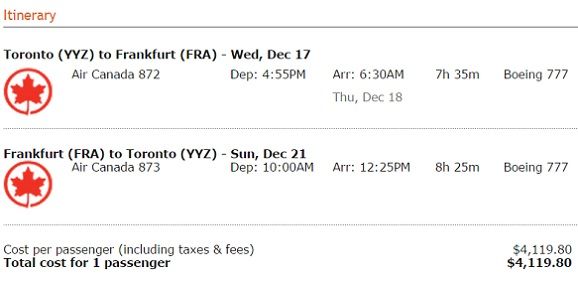
The fuel surcharges on this business class itinerary are a whopping $776.
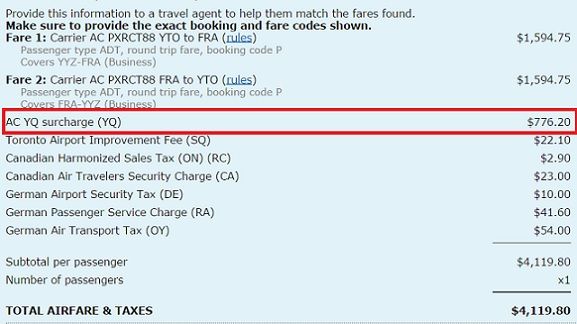
If we add a connection at Washington Dulles you can reduce the fuel surcharge. In other words, fly to Toronto and then just have a Toronto – DC segment at the end which you don’t take.
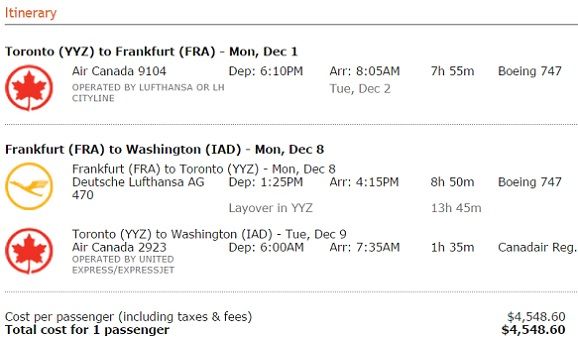
The fuel surcharge drops to $623 ($153 savings on the ‘YQ’).
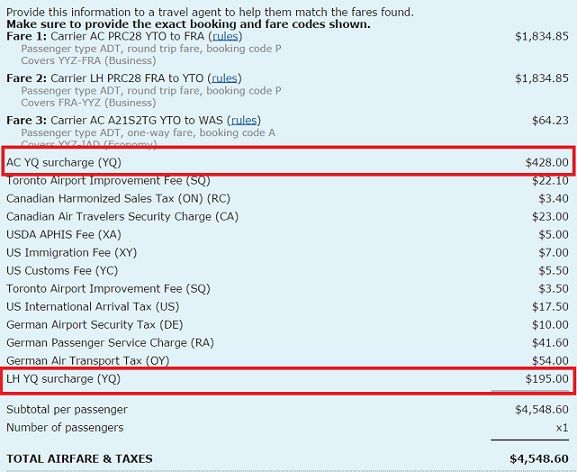
For Asia, Hong Kong is a low fuel surcharge market.
Take a one-way award US – Tokyo – Hong Kong and the fuel surcharges will be lower than US – Tokyo. US – Bangkok – Hong Kong will be lower than US – Bangkok. Again, drop the final segment on the one-way and you save cash.
Here’s Washington Dulles – Tokyo non-stop.

The fuel surcharge is $259.
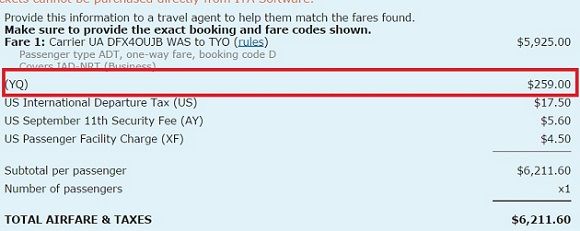
Let’s take a look at Washington Dulles – Tokyo – Hong Kong.
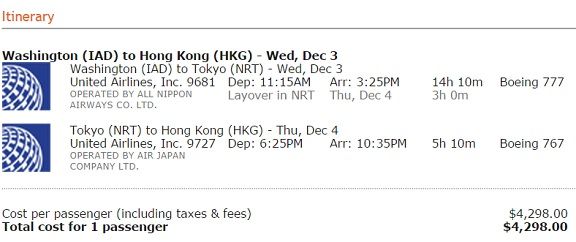
The fuel surcharge for US – Tokyo – Hong Kong is just $104 ($155 savings on the one-way).

Of course any checked bags will usually be checked through to your final destination which on the ticket is Hong Kong. So this doesn’t work nearly as well with checked bags as it does with only carry on bags.
And remember that you can only skip the last flight segment on an itinerary, or you risk having all the rest of your flights cancelled.
Throwaway ticketing can be a great technique to save on paid tickets. And fuel dumps are an underground trick to reduce the price of international tickets. It turns out, where fuel surcharges apply, you can use the two techniques together to save money on award travel.
- You can join the 30,000+ people who see these deals and analysis every day — sign up to receive posts by email (just one e-mail per day) or subscribe to the RSS feed. It’s free. You can also follow me on Twitter for the latest deals. Don’t miss out!


Remember that throw away ticketing where the last segment, ending in the US from an international flight, check bags have to be rechecked
Bit of a confusing example given that you’re illustrating the point with a Europe-Toronto flight that connects in DC, and then advising to add another segment back to DC. I imagine your point holds even for a nonstop Europe-Toronto with an added segment to the US but that would have been an better illustration maybe?
Also, does this hold for a “connecting” flight only, or does it include “stopovers” too. The latter would be better for checked bags, but I imagine would be a loophole to quickly close then.
My understanding of fuel dumps was that they’re never a good idea when you’re using your FF number, as airlines get upset if you do it more than once or twice. As award tickets are booked against your FF program, would you really recommend this for such a small savings?
doing this on a regular basis could result in your frequent flyer account terminated. Perhaps not a big deal if you’re not normally flying Aeroplan and just transferred some points into there to book some award tickets; but if a FF program is your primary program, be careful
International itineraries allow a connection to be up to 24 hours. So one way to get around the “checked bag” issue is to overnight in your connecting city. For example, if you arrive in a connecting city at 11AM, then fly out at 9AM the next morning (a 22 hour connection), the originating carrier will normally allow you to check your bags through to the connecting city instead of the final destination.
any ideas on how to save Fuel surcharges on Korean air award ticket….Way tooooooo expensive…
any ideas on how to save Fuel surcharges on Korean air award ticket….Way tooooooo expensive…thx
Gary,
First and second laws of thermodynamics don’t seem to apply to fuel burned by airplanes…….or, someone is lying.
I thought the DOT advertising rules required the charges to list exactly what they are for, and the idea they are charging more for fuel on the longer route seems like hiding fares in the YQ.
@traderprofit they have to advertise the full price, not tell you what the components are for, and strictly speaking “YQ” is a miscellaneous charge!
Gary, Is there an airline award program that collects YQ for United flights?
Toronto – Frankfurt non-stop 4,119.80
Toronto – Frankfurt – Washington 4,548.60
UHm…did i read the articole too fast or something doesnt add up!!??
what’s the deal in adding a Washington Leg? ok fuel surcharge could be cheaper but total price is not…
????
Yes, David, the math disproves Gary’s point. You don’t save money, you lose more than $400!!!
@Steve and @David, Gary got it right. The cost of an Award ticket is the sum of XXX points plus fuel surcharges. He took a shortcut and used paid tickets because Award seats are hard to find. RT Toronto – FRA – Toronto costs XXX miles plus some money. BUT RT Toronto – FRA – Toronto – IAD costs the SAME XXX miles plus LESS money.